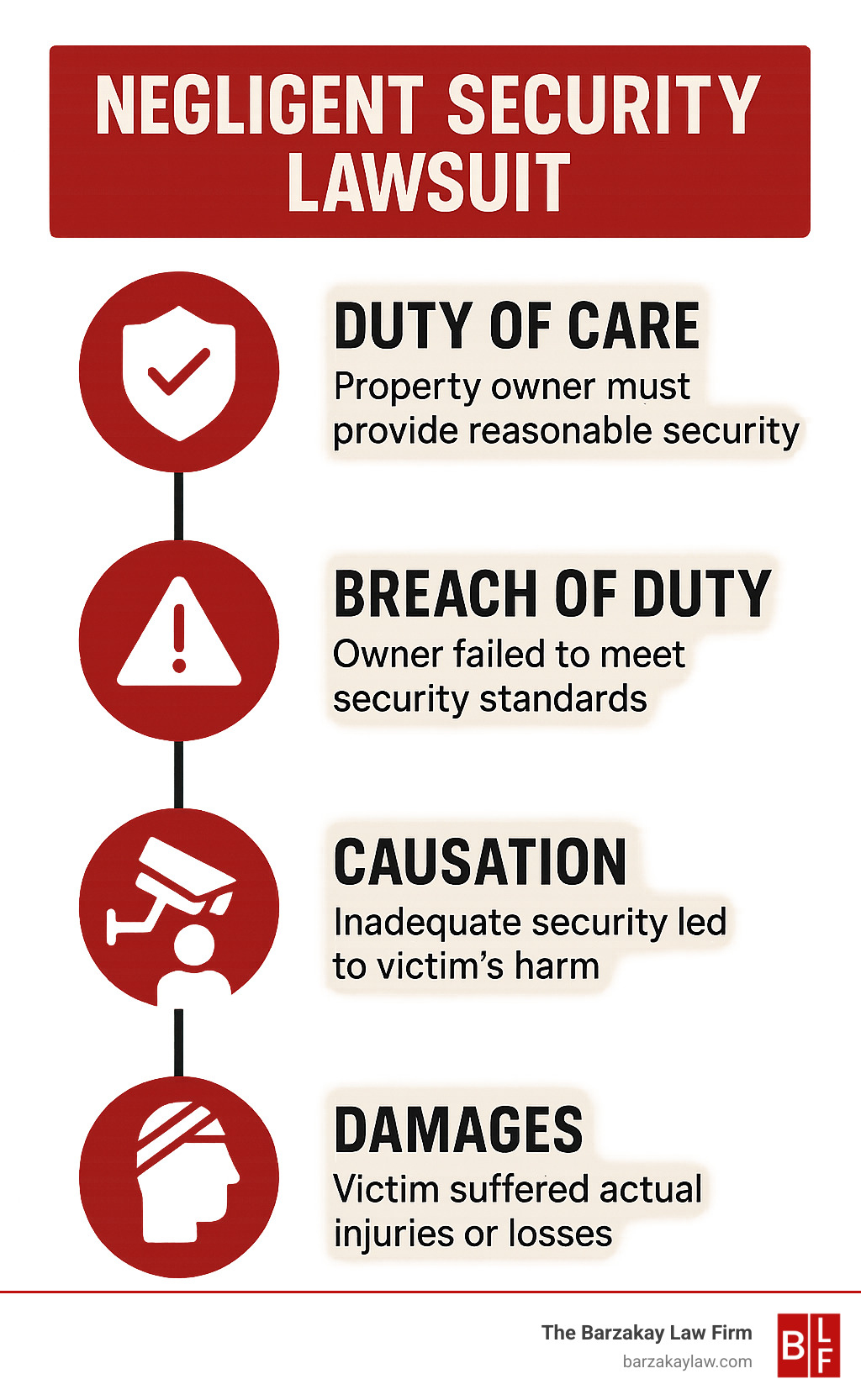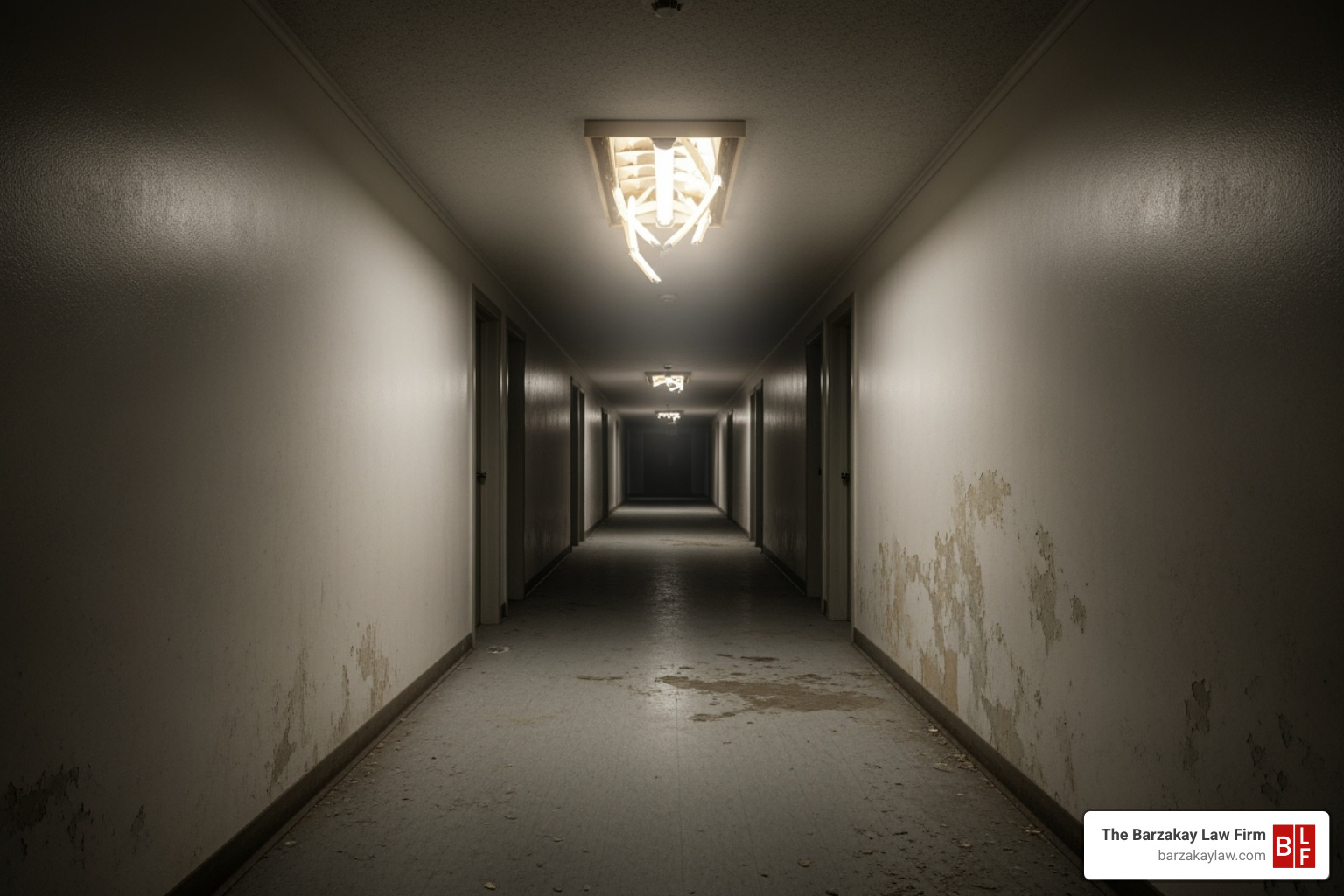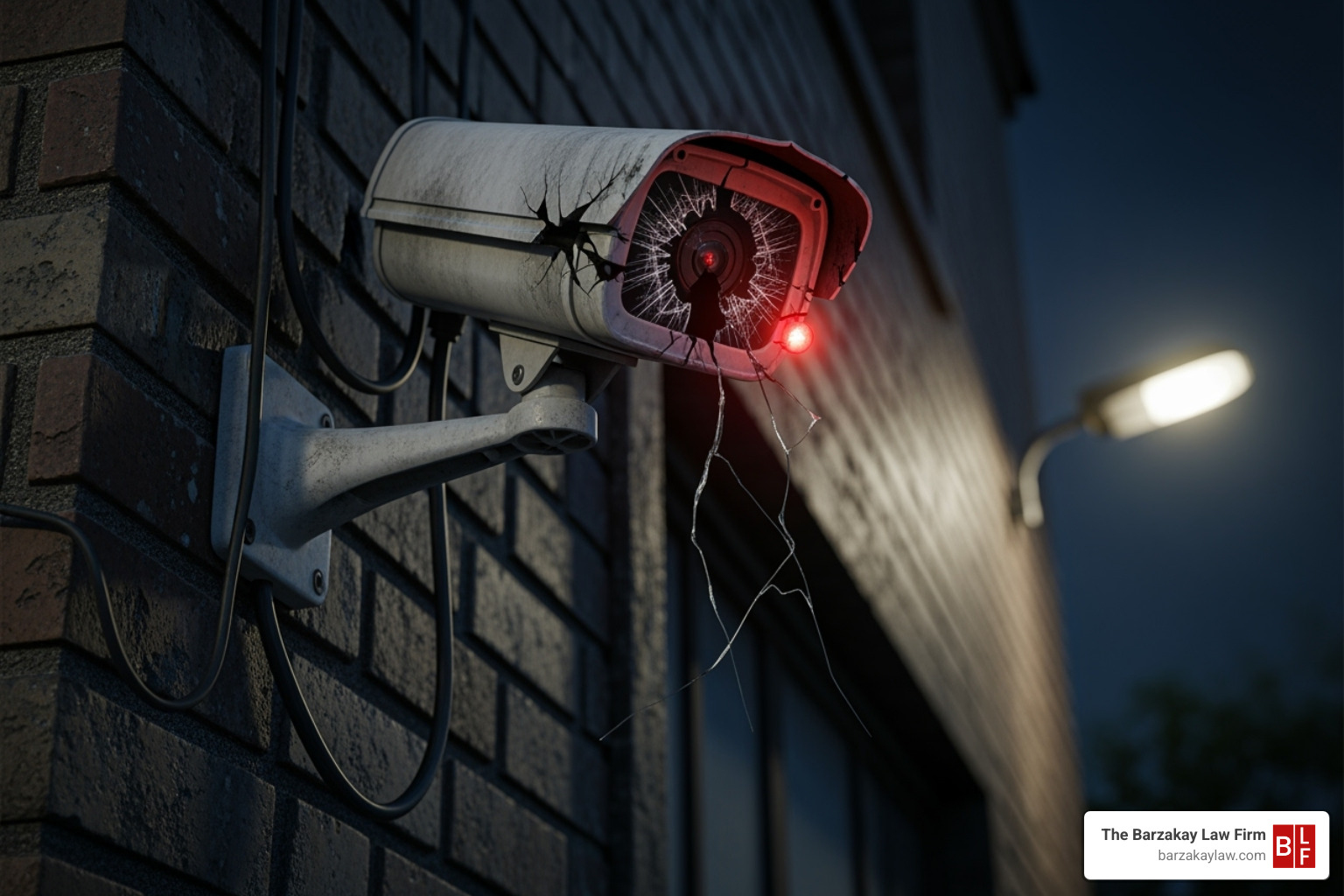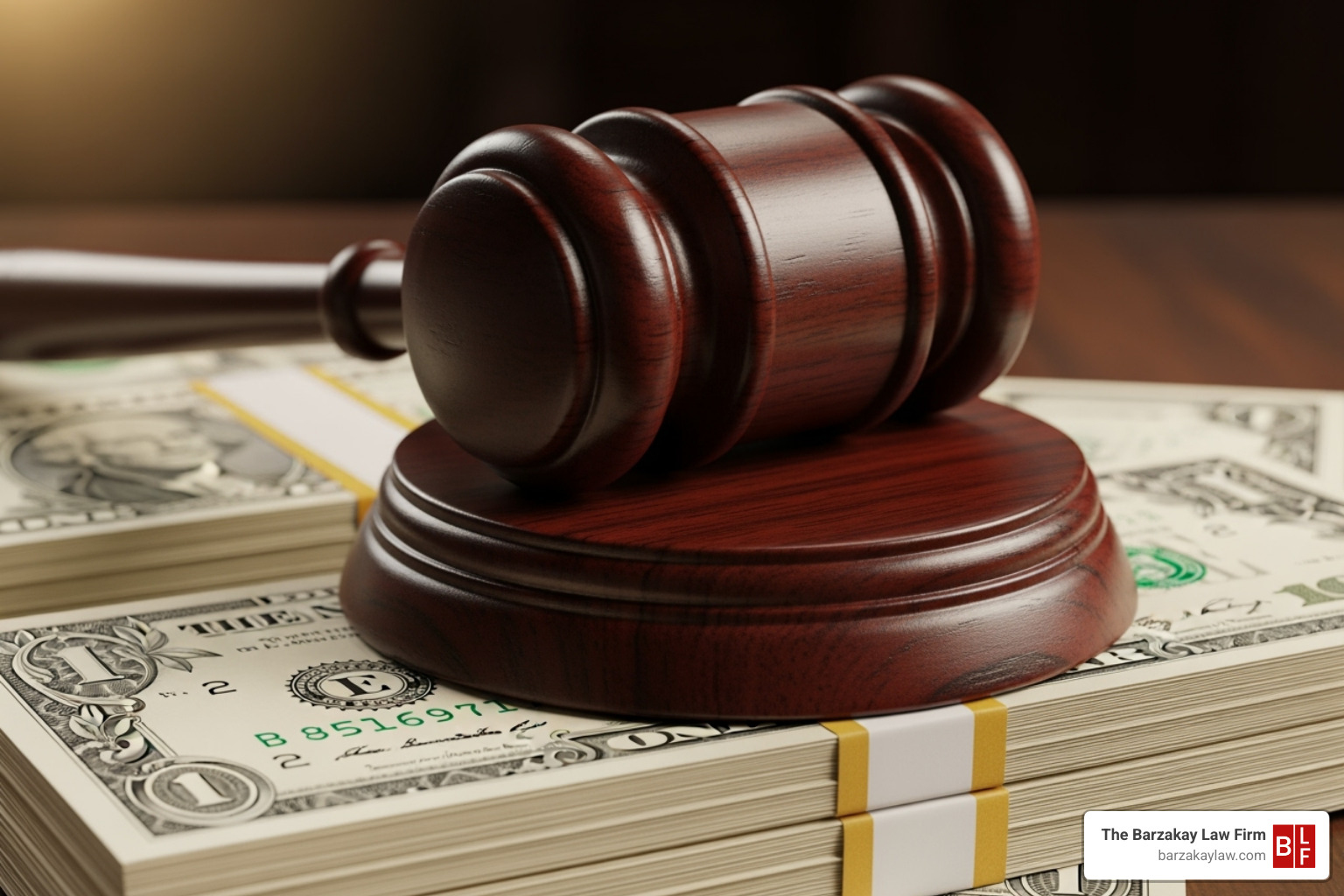Understanding Negligent Security Lawsuits: When Property Owners Are Held Responsible
A negligent security lawsuit is a legal action taken against property owners or managers who failed to provide reasonable security measures, resulting in harm to visitors from criminal acts on their premises. These cases fall under premises liability law and hold property owners accountable when their inadequate security allows foreseeable crimes to occur.
Key Elements of a Negligent Security Lawsuit:
- Duty of Care – Property owner must provide reasonable security for visitors
- Breach of Duty – Owner failed to meet the expected security standard
- Causation – The inadequate security directly led to the victim’s harm
- Damages – Victim suffered actual injuries or losses from the incident
When someone is injured in a crime that could have been prevented with proper security measures, they may have grounds for a negligent security claim. Unlike criminal cases that focus on punishing the attacker, these civil lawsuits target the property owner’s failure to maintain a safe environment.
Common scenarios include:
- Assaults in poorly lit parking lots
- Robberies in apartment buildings with broken locks
- Attacks in nightclubs without adequate security staff
- Violence at properties with a history of criminal activity
The key legal concept is foreseeability – whether the property owner should have reasonably anticipated that criminal activity could occur without proper security measures. If previous crimes happened on or near the property, or if it’s located in a high-crime area, courts may find the owner had a duty to implement stronger security.
These lawsuits often make more financial sense than pursuing the criminal directly, since attackers are typically “judgment-proof” (unable to pay damages), while property owners usually carry liability insurance. Recent verdicts have ranged from thousands to millions of dollars, including a $21.25 million award in Oregon and a $20 million verdict in Georgia.

Simple negligent security lawsuit glossary:
The Legal Framework of a Negligent Security Claim
A negligent security lawsuit is a branch of premises liability that arises when a visitor is harmed by a criminal act that reasonable security could have prevented. To succeed, four elements must be proven:
- Duty of Care – The owner or manager had a legal obligation to provide reasonable security for lawful visitors.
- Breach of Duty – That obligation was not met (e.g., broken lights, missing locks, inadequate guards).
- Causation – The security lapse made the criminal act possible or more likely.
- Damages – The visitor suffered measurable losses such as medical bills or lost income.
Learn more about the legal standards involved from a Security Negligence Attorney.
What Is a Property Owner’s Duty of Care?
“Reasonable” security depends on the type of property, its history, and the surrounding crime rate. A busy nightclub will require different measures than a quiet retail shop. Owners in high-crime areas, or those with prior incidents on-site, are generally expected to install stronger lighting, locks, cameras, and access controls.
Foreseeability: The Cornerstone of a Claim
Courts look at whether the crime was predictable. Evidence often includes:
- Police reports or crime statistics for the neighborhood
- Records of prior similar incidents on the premises
- Written complaints or warnings the owner received
If prior assaults or robberies occurred and no improvements followed, foreseeability—and therefore liability—is likely. Additional details on this concept appear in the Inadequate Security Lawsuit guide.
Who Is Liable and Where Do Incidents Occur?

Several parties may share responsibility in a negligent security lawsuit:
- Property owners and landlords – Primary duty to keep common areas safe
- Property management companies – Liability for ignored maintenance or security complaints
- Commercial tenants – When their individual security failures contribute to an attack
- Security contractors – If guards are untrained or absent during critical hours
Understanding the ownership structure helps identify all sources of insurance coverage.
Common Locations for Negligent Security Claims
Incidents often arise in places where predictable risks go unaddressed, such as:
- Apartment complexes with broken gates or lights
- Hotels and motels that fail to control guest-room access
- Parking garages and lots lacking cameras or patrols
- Nightclubs, bars, and entertainment venues with too few trained staff
- Shopping centers during late-night or holiday hours
- Gas stations on poorly lit corners
- Hospital campuses, college dorms, and standalone ATMs
Statistics from the Bureau of Justice show that parking areas rank among the common places for negligent security incidents.
Why the Criminal Is Rarely Sued
Civil claims target the property owner’s negligence, not the attacker’s intentional act. Offenders typically have no assets to satisfy a judgment, while owners carry liability insurance that can fund medical bills, lost wages, and other damages.
Building a Successful Negligent Security Lawsuit
A persuasive claim relies on concise, well-documented proof:
- Evidence collection – Police reports, surveillance footage, maintenance logs, and prior crime data
- Security assessments – Industry professionals compare existing measures to accepted standards
- Clear link to negligence – Demonstrating how the owner’s failure allowed the assault or robbery to occur
An experienced Security Negligence Lawyer FL can assemble these elements and present them to insurers or, if necessary, a jury.
Common Signs of Inadequate Security

- Poor or missing lighting in entrances, stairwells, and parking areas
- Non-functioning cameras or alarms
- Too few or poorly trained security guards
- Broken locks, fences, or access gates
- Failure to act on prior threats or criminal activity
Statute of Limitations
Deadlines vary by state. In Florida, most personal-injury claims, including negligent security, must be filed within four years (two years for wrongful death). Shorter periods may apply when the defendant is a government agency, making prompt legal advice essential. Details are available from a Negligent Security Attorney.
Compensation and the Role of Insurance

Most commercial properties carry liability insurance that covers injuries caused by inadequate security. After a claim is made, the insurer investigates and often negotiates a settlement to avoid trial. Adjusters may dispute liability or downplay damages, which is why legal representation is valuable.
Damages That May Be Recovered
- Medical expenses: emergency care, surgery, rehabilitation, counseling
- Lost wages and reduced future earning capacity
- Pain, suffering, and emotional distress
- Property losses (phones, jewelry, etc.)
- Wrongful-death damages when a crime is fatal
- Punitive damages in cases of extreme indifference to safety
Data from the CDC show that common assault injuries include fractures, lacerations, and head trauma ().
Recent Results Illustrate Potential Value
- $21.25 million verdict (Oregon 2024) – fatal shooting by a store security guard
- $4.55 million settlement (Florida 2022) – parking-lot shooting at a shopping plaza
- $1.05 million verdict (Miami 2022) – nightclub shooting
- $20 million verdict (Georgia 2022) – assaults at a children’s summer camp
Case outcomes vary based on injury severity, clarity of negligence, and local jury tendencies. Additional insight appears in Negligent Security Claims Miami: Pursuing Compensation for Assault Victims.
Frequently Asked Questions about Negligent Security Lawsuits
What is the difference between a negligent security claim and a standard personal-injury case?
A negligent security claim involves harm from a third-party crime on someone else’s property. The focus is on the owner’s failure to provide reasonable protections that would have made the crime less likely. A typical slip-and-fall case, by contrast, involves hazards created directly by the property condition itself.
Can a lawsuit proceed if the attacker is never caught?
Yes. Liability centers on the property owner’s negligence, not on identifying or prosecuting the criminal. A victim can still recover damages from the owner’s insurance even if police never locate the assailant.
What steps should a victim take immediately after an incident?
- Obtain medical care and keep all records.
- Report the crime to law enforcement and secure a copy of the report.
- Photograph or record unsafe conditions (lighting, locks, cameras) if feasible.
- Gather names and contact information of any witnesses.
- Consult an inadequate security lawyer promptly to protect legal rights and meet filing deadlines.
Holding Negligent Property Owners Accountable
It’s a tough pill to swallow: you or someone you care about was hurt on someone else’s property because they didn’t take basic steps to keep you safe. When a criminal act happens because security was lacking, victims absolutely have the right to seek justice.
A negligent security lawsuit isn’t just about getting compensation for what you’ve been through. It’s also a powerful way to encourage property owners to step up their game and make sure their premises are safer for everyone. This helps prevent similar incidents from happening to others down the road.
We firmly believe that property owners have a fundamental responsibility. They should do everything reasonable to ensure the safety of people visiting or living on their property. When they don’t live up to this duty, and someone gets hurt as a direct result, they need to be held accountable.
Navigating the legal world after a traumatic event can feel overwhelming. That’s where we come in. The Barzakay Law Firm is dedicated to helping victims of inadequate security. We understand these complex cases and are here to guide you every step of the way. You don’t pay us unless we win your case – that’s our contingency fee basis. Our goal is to fight for you and help you get the fair compensation you deserve.
If you or a loved one has been harmed because of inadequate security in places like Hollywood, Miami, Boca Raton, Sunrise, Orlando, or Fort Lauderdale, FL, know your rights. Don’t hesitate to explore your legal options. We’re here to listen and help you understand how you can pursue compensation.
Contact us for a free consultation to discuss your case today. Let’s talk about what happened and how we can help you move forward.
